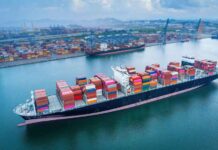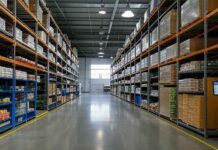Three percent of the world’s pollution comes from people working in the supply chain. They need to use technology-based methods to decarbonize shipping.
The use of digital technologies is changing sea shipping in a way that makes it more environmentally friendly, more efficient, and better overall.
With three percent of the world’s pollution coming from ships, new technologies may help the industry do better while also having less of an impact on the environment.
It’s getting harder and harder for the shipping industry to keep up with the amount of carbon dioxide it puts into the air, which is cause for concern. A big part of the world’s carbon emissions comes from the shipping business. Pollution from it is the same as that from the whole country of Germany.
If the right steps aren’t taken to deal with it, it could be responsible for 11% of all pollution by 2050. In order to keep up with sustainable goals, the shipping business needs to use more eco-friendly methods. Technology is the key to making this change.
Using technology to cut down on pollution
This goal of lowering pollution is very important for the future of ships, and technology offers ways to make this happen. Digital technologies, for example, could help make better use of fuel, find better ways, and eventually improve the economy of operations.
For that reason, this might directly lower the carbon output of the business, making the marine sector a part of the global effort to reduce carbon emissions.
The managing director of Wartsila Water & Waste, Cathy Stephenson, says that shipowners and operators should look for suppliers who pay close attention to detail, understand the ecosystem and context in which a vessel operates, and have the time and resources to fully understand all of a ship’s technical quirks. These are all things that people who own or run ships should do.
Shipping companies can use real-time insights to save money on fuel, predict when equipment will break down, and cut down on downtime by putting data and advanced analytics at the center of their operations.
Because of this, these technologies not only make the world a better place, they also save money and make things safer.
The Internet of Things (IoT) has become a game-changer in this field. It lets shipping companies keep an eye on the condition of their goods and the weather factors that affect it in real time.
Sensors built into containers keep an eye on everything from temperature to humidity. This helps cut down on waste and better-quality control management. The Internet of Things (IoT) makes shipping faster and more flexible, able to change conditions as needed to keep goods safe while also having less of an impact on the environment.
Breakthroughs in green technology and cutting-edge
An enormous amount of cutting edge technology is being used by the shipping business to deal with the environmental problems it faces.
An alternative to heavy fuel oil is hydrogen and liquid natural gas (LNG), which are becoming more popular because they are better for the environment.
These fuels put out less pollution than other fuels, so they may help a ship’s carbon emissions go down a lot.
Other inventions that are good for the earth are:
When it comes to meeting energy needs, solar and wind power systems
Ways to clean up bilge water so that there are fewer pollutants in the ocean
Designs of ships that make them less drag, which means they use less fuel
Predictive maintenance is a type of maintenance that uses AI to figure out when technology will break down before it does.
These technological advances keep ships running normally, with little disruption to their operations, by lowering the chance of expensive breaks and fixes that aren’t needed.
Because of this, shipping companies can cut costs, reduce pollution, and make their ships last longer, all of which are good things.
Intelligent technology not only makes operations run more smoothly, but it also makes it easier for people in the same field to talk to each other. Working together with software made just for marine operations makes things smoother between port leaders, shipping companies, and government bodies that control them. It’s possible that this will speed up processes, make sure rules are followed, and make things safer generally.
Making it possible to move toward sustainability
Using new technology not only helps shipping companies run their businesses better, it also lets them follow more complicated foreign rules. It is possible for automated systems to make sure that safety rules, environmental standards, and business laws are followed. It’s impossible to say enough about how important this is as policies keep changing to meet global environmental goals.
Everyone agrees that artificial intelligence (AI) and cloud technologies will play a big role in the future of shipping. These technologies offer a huge amount of processing power, which lets businesses look at huge amounts of data and make better decisions about everything from when to do repairs to how to plan routes.
Maynard Williams, Managing Director, UK at Accenture, says that there has been a big rise in the demand for cloud computing as businesses continue to look at every part of their operations and see how technology, data, and AI can help them change.
Technology is going to be a big part of moving the shipping industry forward as it continues to change. Businesses that are more committed to digital innovation will not only be more sustainable, but they will also have an edge in a global trade environment that is always changing.
When shipping companies invest in technology, they not only make more money, but they also help the business and the world grow.
As long as shipowners use technology to make sustainability a goal, they can protect both their investments and the environment. Improvements in manufacturing methods, better vessel design, and the use of smart technologies are making transportation more eco-friendly, more efficient, and better able to deal with problems of the future.
Transportation is becoming more environmentally friendly, efficient, and adaptive to the problems of the future as a result of advancements in manufacturing processes, improvements in vessel design, and the use of intelligent technologies.

























